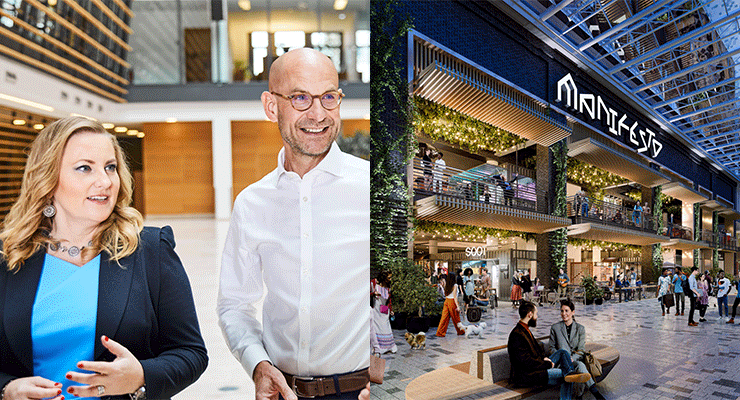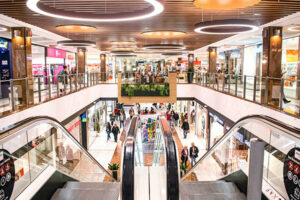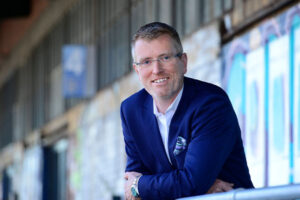ACROSS: Two years ago, ECE underwent a reorganization. What has changed since then?
Joanna Fisher: We at the ECE Group, have positioned ourselves even more distinctly as the real estate expert for all asset classes that we have been for many years now. By forming individual companies that specialize in the individual market segments, such as ECE Marketplaces for our shopping center business, we can now work more focused and even more professional on the development of individual properties and projects in each asset class.
ACROSS: What are some of the priorities at ECE Marketplaces?
Fisher: Even though we hadn’t thought we would be, since our repositioning we have been in continuous crisis mode. Operating the centers in our portfolio has taken up a lot of room and capacity. But from a strategic perspective, we primarily focus on the continuous development of our centers, to find new tenants and concepts and to realize redesigns or comprehensive repositionings. We are also still interested in taking on new management mandates and acquiring centers via our fund, even if the market is currently not exactly an easy one. But challenging times in particular offer excellent opportunities for experts, opportunities we can and will use in an anticyclical manner.
ACROSS: How do you feel about the current real estate sector? How do the figures reflect the mood?
Fisher: If you work in the real estate sector, you should be a positive and optimistic person. And that’s exactly what we are, especially in challenging times. The entire industry is, of course, facing tremendous challenges, but looking at the developments of the last months, there is reason for optimism. Frequencies have recovered slightly over the last months, and sales even more so, which shows customers are coming back to brick-and-mortar stores – and they are coming to buy. Put in concrete terms, current frequencies are about 10 to 15 percent below 2019 levels, in July and August they were even a mere six and eight percent below, respectively. When it comes to sales, we have almost reached 2019 levels, or are even slightly above them. After all, we experience the international markets as being much more dynamic and positive, Germany is recovering more slowly. Having said that, retailers continue to face huge challenges, as do we as operators.
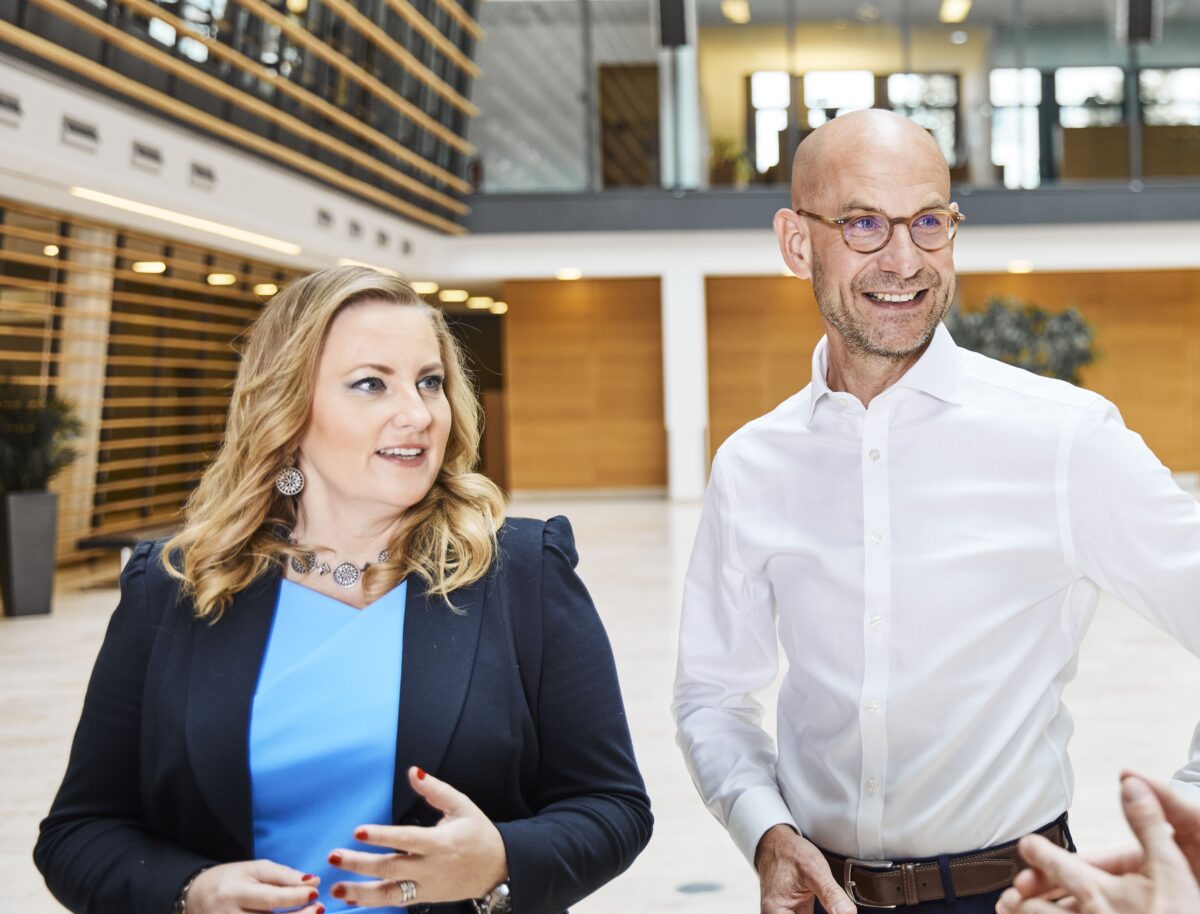
Joanna Fisher, CEO at ECE Marketplaces, and Steffen Friedlein, Managing Director Leasing Services at ECE Marketplaces
ACROSS: How are these challenges impacting retailers?
Steffen Friedlein: We have never seen so many challenges come crashing down at once on our retail partners as well as our investors and ourselves as operators. A situation like this inevitably impacts the performance of retailers and with it, our centers. But on the tenant’s side, the situation is in fact extremely heterogeneous, we need to make a clear distinction: Currently, some retailers are economically not able to act as they would really like – or need – to do in order to develop and modernize their concepts in the face of the rapidly increasing and dynamic changes – even if they have the ideas and plans to do so. On the other hand, there are a lot of excellent examples of successful and innovative concepts that have made it through the crisis really well and are particularly now investing in their products and their brands and are continuing to expand. In that respect, we see the current situation as an accelerator and engine for ideas and innovations.
ACROSS: What kind of ideas and innovations?
Friedlein: A lot of retailers are investing heavily in their online activities and in their stationary stores, because they have realized how important a stationary presence is for the success of retail concepts. Current developments have shown that the initial increase in online sales of large retailers in particular have been starting to stagnate, many times at around 20 percent or even decreasing. This is an extremely positive message for stationary retail.
ACROSS: Current surveys on the consumer climate don’t leave much room for optimism. Have you noticed a change in consumer confidence?
Fisher: At the moment, we are still happy with the current developments. Fall offers various great shopping occasions, and Christmas is just around the corner. Despite the fact that a lot of costs have risen sharply, we are sensing more of a propensity to consume, but that will probably change by the beginning of next year.
ACROSS: Which consumer trends are retailers currently focusing on?
Fisher: Retail thrives on a demand for goods and services. That’s why we always look to the consumers to see what moves them, and we currently see two trends: At the moment, leisure and experiences are extremely important to customers, a lot of them want to treat themselves to a good time, which we can offer at our shopping centers. At the same time, local supply and meeting daily needs and demands are issues that have become increasingly relevant, especially during the crisis. Locations with a high competence in local supply in particular made it through the Corona crisis virtually unscathed, and there are a lot of expansive concepts in that field. For the retail real estate sector, this is a great opportunity, as we can react extremely flexibly to this demand in the shopping centers and adapt them accordingly.
ACROSS: How are store sizes currently developing?
Friedlein: There’s a lot of movement, in both directions, it highly depends on the sector. Looking at consumer electronics concepts, for example, the strategy of “rightsizing” can be observed very well. Their focus is not on reducing space but on what customers really want ‑ a customer and future oriented approach. Space has become extremely valuable, so offers are selected and tailored to the location. For us, this opens up new opportunities, as it allows us to put highly demanded spaces and formats back on the market. On the other hand, there are a number of growing concepts, particularly in the textile sector, which are performing extraordinarily well and are looking for larger stores and more space. These are all partners with whom we have been able to open a lot of stores and sign new rental contracts in the past years and the last months.
ACROSS: Which sectors or concepts are struggling the most?
Fisher: Service providers, such as travel agencies and hairdressers, and the food and beverage sector suffered particularly during the pandemic; they are currently also facing tremendous personnel problems. And yet the food sector is once again showing a positive trend. Textile and shoe concepts in smaller spaces are continuing to see quite some challenges. The lack of personnel is still a huge issue for the entire retail sector, along with energy costs and the supply of goods, and you can’t expand if you don’t have the staff. At the moment, retail truly is a sector for experts: It needs people who know the business well. There are a lot of opportunities, there’s no doubt about that, but you need to be very willing to innovate and really know the industry to recognize and harness these opportunities.
ACROSS: What do successful retail concepts look like in concrete terms?
Friedlein: They focus consistently on their strengths. These companies have not only come through the crisis very well, they are also expanding and even introducing new brands in Germany. For example, they fully rely on seamless omnichannel services, with the same brand experience on all channels, which helps customers transition seamlessly from one retail variant to the next, depending on time and budgets. In contrast, there are concepts that still manage without an online presence and are still highly successful, also because they invest in their employees, their shops and supplier relationships with foresight.
ACROSS: What new concepts do you see on the market?
Friedlein: There are a lot of innovative concepts, some of which we don’t yet have at our centers. This is one of the reasons why we have decided to structure our leasing division by segments pursuing the goal to specifically find successful international concepts in each sector. Sneakers and baseball caps are currently great examples. Successful concepts from Germany are internationally expanding. Conversely, concepts from English-speaking countries such as baseball cap supplier Lids are entering the German market – a completely new concept that has recognized a niche and developed its own store concept. An excellent example of the innovative power in retail!
ACROSS: Earlier you mentioned that energy will become a more pressing matter in view of winter. How are you dealing with the current discussion on energy savings?
Fisher: Contrary to the impression that sometimes prevails in public, this topic has been on our agenda for years. We at ECE have achieved a great deal in terms of sustainability and energy efficiency in real estate over the past few years. Actions have been taken that range from installing efficient heating and ventilation systems to fully converting to LED lighting and far beyond. In the current situation we have, of course, we have also implemented a number of additional saving measures, such as shortening operation times for escalators and saving on lighting in times of lower frequencies. This helps save energy and keeps our tenants’ utility costs down at the same time. We have analyzed each of the centers precisely and we are well prepared even if the situation should get more challenging.
ACROSS: Another matter that is at times hotly disputed between tenants and landlords is how to handle online sales.
Friedlein: Obviously, this is a matter that we and our owners have to deal with. Again, finding amicable and balanced solutions that work for both parties is key. Investing in stationary retail trade also means owners have to invest in the appeal of their objects, in modernizations and renovations. But that doesn’t work if at the end of the day, the additional online sales are received solely on the tenants’ side and none is left for the rent, especially as we have been seeing a trend towards shorter rental contract terms and a higher share of sales-based rent. We therefore need a joint model for tenants and investors that takes at least a portion of online sales into account so that owners will be able to invest in their objects in the future.
ACROSS: Which role do investors play at the moment? What are their demands?
Friedlein: Investors are facing the same challenges as our retailers, they are all in the same boat. As operators, we aim to present investors with a transparent picture, and not a single investor would turn a blind eye to reality and merely insist on the rent coming in; investors are extremely understanding when it comes to the current situation and the challenges on the market. Right now, inflation is a huge issue, as is the question of how this will impact rents as they are indexed. As operators, our task is to assess the situation and proactively develop models that are appropriate in this situation and fair for all parties. The aim is to find solutions based on partnership, which on the one hand take into account the existing contractual agreements, but on the other hand recognize the changed reality. A waiver of the agreed indexing cannot be the solution. At the same time it is understandable and must be taken into account that the current inflation is difficult to reflect in the cost calculations of the tenants. Therefore, it is important to find mediating approaches that do justice to both sides and work in the sense of partnership – that’s what matters.
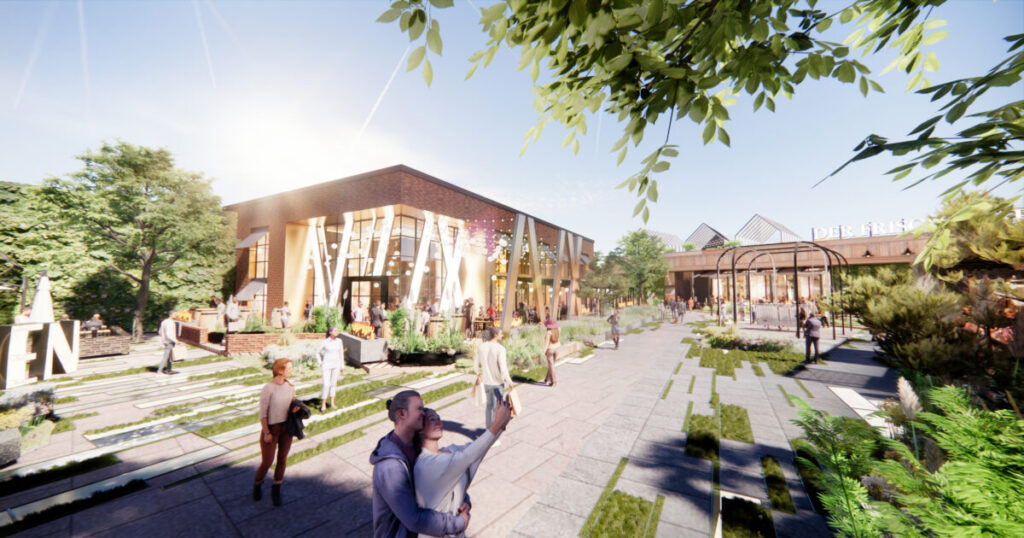
Food Cluster @ Main-Taunus-Zentrum Shopping Center (Sulzbach, Germany)
With an emphasis on a high-quality food and beverage concept, the owners of the Main-Taunus-Zentrum are investing €20 million in the further development of the shopping center. “The center has strong roots in this region, and we have continuously worked on its further development,” says Fisher. “However, the food offering was still heavily dominated by restaurants that focused on feeding customers, not on entertaining them.” This is all about to change: By 2024, the new “Foodgarden” will occupy around 7,000 sq m at the heart of the shopping center, replacing a former department store. The “Foodgarden” will comprise five detached restaurant buildings with attractive outdoor areas and up to seven regional and international restaurant concepts and supplementary delicatessen offers.
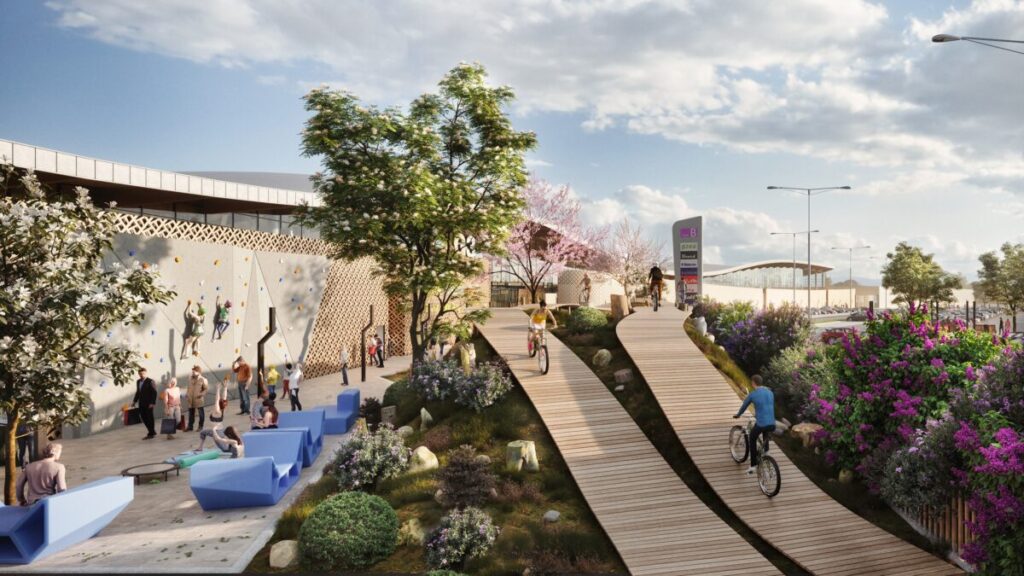
Sports Cluster @ G3 Shopping Resort (Gerasdorf, Austria)
The G3 shopping resort is set to become a sports cluster. “The Viennese shopping center market is dominated by extremely strong objects,” Fisher says. “When it comes to giving this location a clear distinguishing feature, sports are the way to go.” A 5,000 sq m sales area and a 3,000 sq m outdoor area make up the new focal point at G3. The aim here is to connect the indoor and outdoor experience by investing €12 million in the center. Outdoor activities are at the core of the redesign and include a pump track, skate park, climbing wall, bike test track, shoe trail and kids’ area. Completion is planned for 2024.
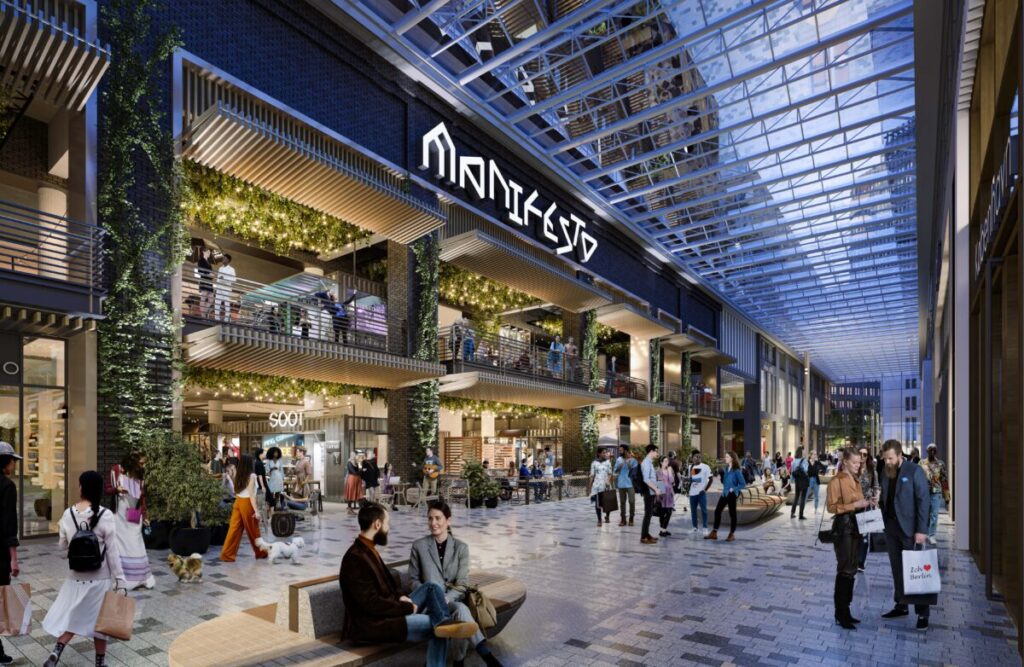
Lifestyle Hub @ The Playce (Berlin, Germany)
The former Potsdamer Platz Arkaden center is currently being fully renovated and repositioned by Brookfield as the owner of the Potsdamer Platz and the shopping center operator – including rebranding the center as The Playce. “This is quarter development par excellence,” Fisher says. “Instead of a traditional shopping center, we are creating a retail street with various interactive, stand-alone experiences.” Stores in The Playce will open successively until the end of March 2023.

